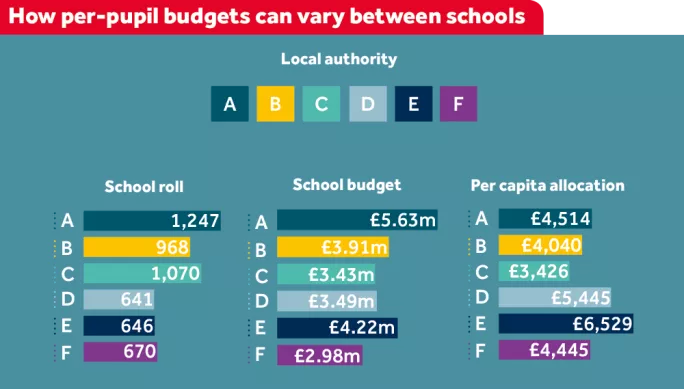Heads face new ‘fair funding’ power struggle

Power, devolution, control, autonomy, responsibility. Call it what you will, Scotland’s headteachers are going to get a whole lot more of it. Now, detailed analysis of reaction to this landmark shift has laid bare fears over the financial, legal and workload burdens that may shift onto schools - as well as concerns that vulnerable pupils will fall between newly created cracks in the system.
Quietly published at the same time as a flurry of education statistics and funding announcements, analysis for the Scottish government on responses to a consultation around “fair funding” for schools explores reaction to plans for headteachers to take more control over education spending. It finds deep dissatisfaction among headteachers about current arrangements, which see large disparities in schools’ funding levels around Scotland.
Figures shared exclusively with Tes Scotland show that in large secondaries in the Central Belt, depending on which council a school is located in, a headteacher’s devolved budget can vary by more than £1,000 per pupil.
Prohibitive costs
There is also concern in the education system that headteachers are already overloaded and that things will only get worse if they take on more responsibility. Headteachers warn that they would need “in-house” business managers if they are to take on more financial, HR and procurement responsibilities - but the financial cost of that may be prohibitive.
Many headteachers see the current system of devolved school management (DSM) budgets as flawed, with excessive bureaucracy - stemming from multiple funding streams and “burdensome” procurement processes - “preventing headteachers from focusing on attainment within schools”.
Headteachers also find that the current system creates “inequitable allocation of resources”, making it difficult to plan beyond the next year.
There is widespread support for more control over staffing and educational resources. Some headteachers say “they would be able to find better deals, more quickly, themselves” if they were not reliant on local authority recruitment processes - and that there is some “distrust in council decision making”, with some headteachers having more autonomy than others.

Jim Thewliss, general secretary of School Leaders Scotland, tells Tes Scotland that the current system of allocating money to schools leads to some “shocking” disparities.
“It would be fair to say, however, that there is a fairly common view that we could be doing things better and that we could be targeting resources more effectively,” says Thewliss, who represents secondary heads.
But there is a strong sense of “careful what you wish for” through the report’s analysis of 85 written submissions and six focus groups with headteachers. As well as headteachers, it considers the views of local authorities, class teachers, parents and others - with most concerned over the “risks” of giving schools more control of spending.
Headteachers have repeatedly warned that to take on more responsibility for spending and staffing - meaning less reliance on local authority support - they would need full-time business managers to oversee issues not directly related to learning and teaching.
One unnamed council, however, says it would cost £2.1 million to provide a business manager in every school, or £360,000 for a school cluster - at a time when local education spending is under increasing pressure (“Councils have ‘scope to reduce teacher numbers’”, Tes Scotland, 23 February).
Bearing the risk
Some respondents argue that certain services currently available to all schools as a result of shared council budgets would not be viable at a school level, including areas around additional support needs (ASN), educational psychology and specialist staff training. There is also concern over the future of schools’ support for LGBT issues and English as an additional language.
The report highlights fears that leaving schools to manage such areas of spending “would be inefficient, affect existing budgets, and leave some schools at financial risk”.
Focus groups with headteachers raised concerns about legal risks: that “they would be accountable for events outside their control” such as decreasing pupil attainment caused by factors beyond the school gates. Many headteachers and teachers fear “coming under fire” from parents.
Local government organisation Cosla is resisting changes to the system of education spending, insisting that councils already “ensure that public money is spent efficiently and effectively”. A spokesman says it is important that “responsibility for school finance remains with locally elected politicians who can be held accountable to their communities”.
Greg Dempster, general secretary of primary school leaders’ body AHDS, says the government report “provides a good reflection of the range of views across various interest groups”. He calls for more clarity around new governance arrangements, adding that the report highlights “tensions” around funding for “loosely-defined” areas such as the new regional improvement collaboratives.
A Scottish government spokesman says: “Our education reforms are focused on giving schools and headteachers more power and money to raise standards and close the attainment gap. Our reform proposals are based on international evidence of how high-performing education systems work - and will deliver extra help for teachers in the classroom, more professional development and a stronger voice for parents and pupils.”
He adds: “We will give careful consideration to feedback on our consultations on fair funding and the Education (Scotland) Bill.”
You need a Tes subscription to read this article
Subscribe now to read this article and get other subscriber-only content:
- Unlimited access to all Tes magazine content
- Exclusive subscriber-only stories
- Award-winning email newsletters
Already a subscriber? Log in
You need a subscription to read this article
Subscribe now to read this article and get other subscriber-only content, including:
- Unlimited access to all Tes magazine content
- Exclusive subscriber-only stories
- Award-winning email newsletters